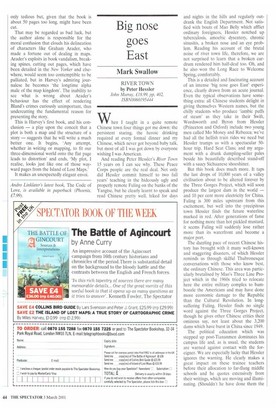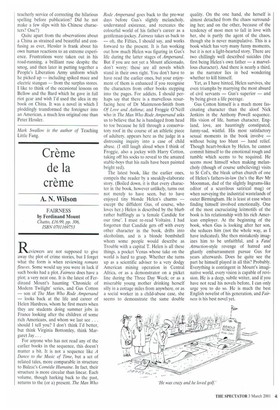Big nose goes East
Mark Swallow
RIVER TOWN by Peter Hessler John Murray, £18.99, pp, 402, ISBN0060195444 When I taught in a quite remote Chinese town four things got me down: the persistent staring, the heroic drinking required at every formal dinner and my Chinese, which never got beyond baby talk, but most of all I was got down by everyone wishing I was American.
And reading Peter Hessler's River Town 15 years on I can see why. These Peace Corps people are the real deal. Not only did Hessler commit himself to two full years' teaching in the hideously ugly and properly remote Fuling on the banks of the Yangtse, but he clearly learnt to speak and read Chinese pretty well, hiked for days
and nights in the hills and regularly outdrank the English Department. Not satisfied with bouts of Mao Belly which afflict ordinary foreigners, Hessler notched up tuberculosis, amoebic dysentery, chronic sinusitis, a broken nose and an eye problem. Reading his account of the brutal noise of river town life, therefore, we are not surprised to learn that a broken eardrum rendered him half-deaf too. Oh, and he also won the Long Race to Welcome Spring, comfortably.
This is a detailed and fascinating account of an intense 'big nose goes East' experience, clearly drawn from an acute journal. Even the typical observations have something extra: all Chinese students delight in giving themselves Western names, but the chilly students who produce 'iambic puffs of steam' as they take in their Swift, Wordsworth and Byron from Hessler (Princeton and Oxford) include two young men called Mo Money and Rebecca; we've had all the hellish train rides we need but Hessler trumps us with a spectacular 50hour trip, Hard Seat Class; and my argument with a drunk dumpling-seller pales beside his beautifully described stand-off with a saucy Sichuanese shoeshiner.
But this book does much more. It taps the last drops of 10,000 years of a valley civilisation about to be altered forever by the Three Gorges Project, which will soon produce the largest dam in the world — and 10 per cent more electricity for China. Fuling is 300 miles upstream from this excitement, but well into the precipitous town Hessler finds the future waterline marked in red. After generations of fame for nothing more than hot pickled mustard, it seems Fuling will suddenly lose rather more than its waterfront and become a major port.
The dazzling pace of recent Chinese history has brought with it many well-known and staggering disasters, of which Hessler reminds us through skilful Thubronesque conversations with those who know best, the ordinary Chinese. This area was particularly brutalised by Mao's Three Line Project which in the 1960s tried to relocate here the entire military complex to bamboozle the Americans and may have done more economic damage to the Republic than the Cultural Revolution. In longsuffering Fuling, Hessler finds no single word against the Three Gorges Project, though he gives other Chinese critics their ominous say, not least about the 3,200 dams which have burst in China since 1949.
The political education which was stepped up post-Tiananmen dominates his campus life and, as is usual, the students are warned against contact with the foreigner. We are especially lucky that Hessler ignores the warning. He clearly makes a great impact on these trainee teachers before their allocation to far-flung middle schools and he quotes extensively from their writings, which are moving and illuminating. (Shouldn't he have done them the teacherly service of correcting the hilarious spelling before publication? Did he not make a few slips with his Chinese characters? One?) Quite apart from the observations about a China as strained and beautiful and confusing as ever, Hessler is frank about his own human reactions to an extreme experience. Frustrations were taken out in his road-running, a brilliant ruse despite the smog, and then later in putting together a People's Liberation Army uniform which he picked up — including spiked mace and electric stungun — from the surplus stores. I like to think of the occasional lessons on Bellow and the Bard which he gave in full riot gear and wish I'd used the idea in my book on China. It was a novel in which I ploddingly transformed the foreigner into an American, a much less original one than Peter Hessler.
Mark Swallow is the author of Teaching Little Fang.













































































 Previous page
Previous page